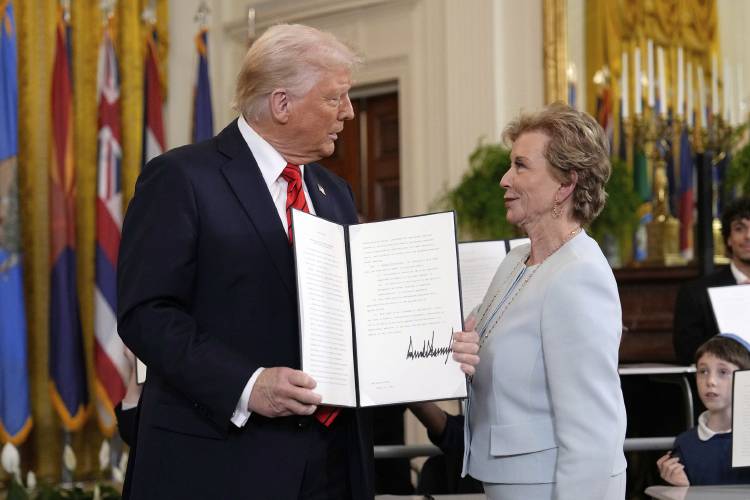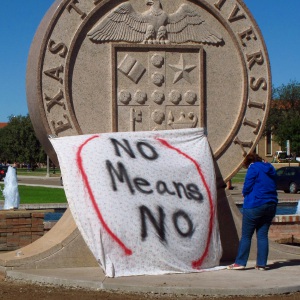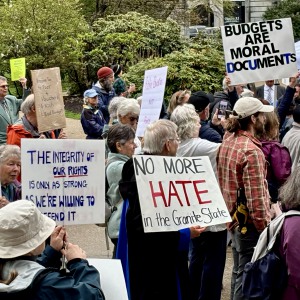Opinion: Writing when the world is on fire

President Donald Trump holds up a signed executive order alongside Secretary of Education Linda McMahon in the East Room of the White House in Washington, Thursday, March 20, 2025. (AP Photo/Ben Curtis) Ben Curtis
| Published: 04-30-2025 11:52 AM |
Parker Potter is a former archaeologist and historian and a retired lawyer. He is currently a semi-professional dogwalker who lives and works in Contoocook.
I have future columns drafted and stacked like cordwood on the corner of my desk. I’ve got enough of them written to take me into November. You see, when I get an idea for a column on my morning walk, I head home and put it on paper, for fear of losing it. When I’ve turned an idea into a finished column, I find an appropriate place for it in the parade of columns I have already written. So far, so good.
But here’s the problem: Nearly all the columns in my stockpile were written before the world caught on fire.
My stockpile of unpublished columns include two more installments in a popular-culture trilogy, but they will have to wait. A discussion of my favorite movies and my musings on the history of television are entertaining enough, but the world is on fire. I can’t put out the fire, but I hope I can write about it in a way that is helpful.
Like many people, I am finding that the fire I keep talking about is touching many aspects of my life. For one thing, my IRA is being incinerated, but I am no economist, so I have little to say on that topic that is worth listening to. In June, my family and I will be traveling abroad – a trip planned before the fire broke out – and I have more than a little trepidation about that. I’ll be the sheepish American. Or the apologetic American. In any event, I’ll be none too proud, and I’ll avoid wearing anything that gives away my nationality. Talk about a first-world problem.
Returning to the ashes of my IRA, I earned some of what has gone up in smoke during my brief career as a historian, and for those who have worked in that field, the fire is burning there, too. Specifically, I refer to recent executive orders mandating the way in which American history is to be told, orders directed to the National Park Service, federally funded museums and all manner of other government agencies that present historical materials.
On the surface, those orders purport to promote national pride and unity while bringing an end to “divisiveness” in the telling of American history. According to news reports, these orders have been implemented by scrubbing references to women, people of color and others from historical narratives. The rationale is that narratives that single out members of minorities are divisive and harmful to the project of using history to inspire pride and national unity.
The theory is that we should just do history, not women’s history, Black history or any other form of history that focuses on specific groups. But here’s the problem. There is no such thing as just plain history. The stories that the Trump executive orders would have us return to are not just history, they are white history, history told from the perspective of rich, white men.
Article continues after...
Yesterday's Most Read Articles
 ‘I thought we had some more time’ – Coping with the murder-suicide of a young Pembroke mother and son
‘I thought we had some more time’ – Coping with the murder-suicide of a young Pembroke mother and son
 Owners of Lewis Farm prepare to bring back agritourism after long dispute with city of Concord
Owners of Lewis Farm prepare to bring back agritourism after long dispute with city of Concord
 Historic Tilton Island Park Bridge will be reopened unless Trump takes back a federal grant
Historic Tilton Island Park Bridge will be reopened unless Trump takes back a federal grant
 Five former Concord Crush girls at St. Paul’s are soon to leave the nest to play NCAA Women’s Lacrosse
Five former Concord Crush girls at St. Paul’s are soon to leave the nest to play NCAA Women’s Lacrosse
 As Canadian travel to the U.S. falls, North Country businesses are eyeing this Victoria Day weekend to predict impacts in New Hampshire
As Canadian travel to the U.S. falls, North Country businesses are eyeing this Victoria Day weekend to predict impacts in New Hampshire
 ‘Folks who use it should pay for it’ — City manager proposes clubhouse plan with smaller tax impact
‘Folks who use it should pay for it’ — City manager proposes clubhouse plan with smaller tax impact
The “unity” these orders promote is a very specific and coercive form of unity: Line up and celebrate a version of history that focuses on the achievements of rich white men or risk being labeled an anti-American troublemaker.
This approach to national unity is tied to the idea of “divisive concepts,” and the position that some historical topics should be avoided because they are divisive rather than unifying. As I remember some of the debates over “divisive concepts” several years ago, people were suggesting that Black history and slavery were topics to avoid because teaching about them made white students feel ashamed.
But if it is divisive to teach white students about the injustices perpetrated against Black Americans, isn’t it just as divisive to teach a whitewashed version of history that fails to acknowledge those injustices? In other words, the litmus test for whether a concept is “divisive” cannot be whether or not it makes white people uncomfortable. White history can be just as divisive as women’s history, Black history or any of the other alternative histories targeted by the Trump executive orders.
We can do better. And, interestingly, this takes me back to my very first My Turn column, “Two things can be true.” In that column, I championed the idea that it is possible to recognize, simultaneously, the genius of our Founders in establishing our form of government and the original sins that accompanied the birth of our nation, using enslaved people stolen from Africa to work land stolen from the Native Americans who first inhabited it.
The historian’s job is not to unconditionally praise or condemn our Founders. Rather, it is to learn how they could reconcile the idea that all men are created equal with the inequality inherent in the institution of slavery and help us, today, to recognize and overcome such contradictions. If there is some discomfort involved in the struggle to avoid making the mistakes of the past – and I hope that all would agree that slavery was a mistake – that is a price worth paying.







 Opinion: In the fight to stop sexual violence, can polio hold the solutions?
Opinion: In the fight to stop sexual violence, can polio hold the solutions? Opinion: Where are the permanent solutions for a more stable budget?
Opinion: Where are the permanent solutions for a more stable budget? Opinion: My memories of Vietnam 50 years later
Opinion: My memories of Vietnam 50 years later Opinion: Concord officials: Can we sit and talk?
Opinion: Concord officials: Can we sit and talk?
